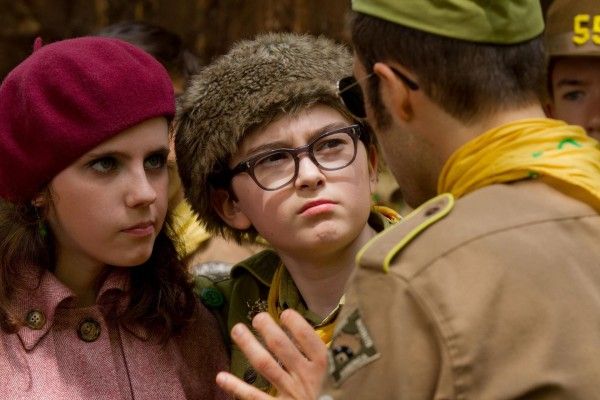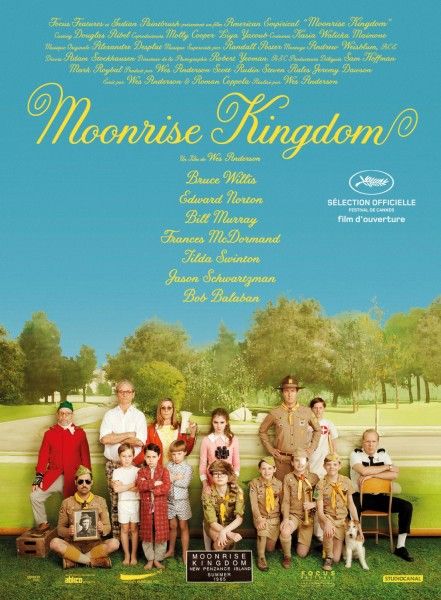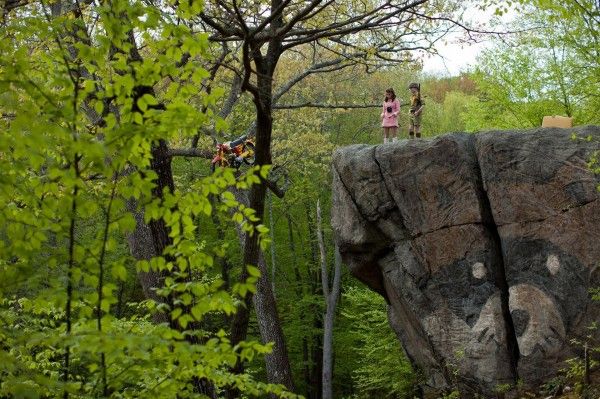Set on an island off the coast of New England in the summer of 1965, Moonrise Kingdom is the charming, sweet and sometimes melancholy story of two 12-year-olds, named Sam (Jared Gilman) and Suzy (Kara Hayward), who fall in love and run away together into the wilderness. As various authorities try to hunt them down, a violent storm is heading in from off-shore, turning the peaceful island community and all of its quirky inhabitants upside down.
At the film’s press day, co-writer Roman Coppola, who also served as a producer and co-writer on The Darjeeling Limited, talked about his collaborations with two-time Academy Award nominated filmmaker Wes Anderson, the genesis of this particular project, creating these unique young characters, and how much he was on set during filming. He also talked about his next film, A Glimpse Inside the Mind of Charles Swan III, and that he hopes he has the opportunity to make more of his own features, in the future. Check out what he had to say after the jump.
Question: How would you describe the tone of this film?
ROMAN COPPOLA: Geez, well, that’s a good question. To really genuinely answer that, I feel it has a playfulness and a lightness, but covering deeper, more thoughtful concerns.
When did you come onto this project? Were you there from the start?
COPPOLA: Before we started working on Darjeeling, Wes [Anderson] had visited this island and cooked up this notion of the story of two kids that lived on an island. There’s a real island that he had visited that’s an odd place where very few families live. So, I was aware that he had this idea. After Darjeeling, he started to work on it and I said, “Oh, how’s the island movie going?,” and he filled me in a bit and said, “It takes place in the world of scouting and I have these two young lovers.” He even gave me about 10 pages, at a certain point, and it was really fun to hear about it and be a part of it and get an inside line on it. And then, the next week, I was like, “What’s next?,” and he said, “I’m not really sure.” I said, “Where are the other pages?,” and he said, “I don’t really have any.”
For a few weeks, he was just stuck and nothing was really happening. So, I happened to pay him a visit and started to ask him more questions. I said, “Last you left off, you had this kid in a canoe. What’s happening with his parents? What do they think?” He said, “Well, he doesn’t really have any parents?” I was like, “Oh, is he an orphan?,” and he said, “Yeah, I think he is.” I said, “Where did he live before this?,” and he said, “Well, he probably was in foster care.” Slowly, I would ask the right questions that helped to draw it out. Because we have a good rapport and we’re friends and we’d the experience of writing on Darjeeling, it started to just pour out, honestly. We spent a few weeks together, acting it out. He gestated on it for quite some time, and then I came in to help realize it. It was an interesting experience for me, just as a person, aside from being a writer.
Do you always work in the same room, or do you trade pages, and how did the experience of working on Moonrise Kingdom compare to working on The Darjeeling Limited?
COPPOLA: Darjeeling was a little different, in that it was a given that, since the story had to do with three brothers, Jason [Schwartzman], Wes and I became those brothers and we had a lot of adventures together. We went to India, and we would go to restaurants and walk around at night, and do all these things that ended up being in the movie. We actually lived together for months, in the creation of that movie, and then also during the filming. It was all part of this big experience. In the case of Moonrise, it was different, in that it wasn’t something you could live, in that way.
In terms of the actual writing, what’s unique about this is that I’m co-writing with Wes, but I’m also writing in service of the director and Wes is the director. He is really the arbiter of where the path is going to go. As a director myself, you want to have colleagues and collaborators that respect your authority as the director. I’m very comfortable with that, and I’ve done a lot of work in second unit. He holds the pencil, and he’s the person who really defines how it goes on the page. There are a few instances in Darjeeling where I wrote a certain section, but in the case of Moonrise, he really defined what words ended up on the page and I was just there, trying to draw it out and bounce ideas off of. We also do a lot of improvisation. Between the two of us, we’ll get a little banter going and, before you know it, you have something.
Can you talk about creating the characters of Sam (Jared Gilman) and Suzy (Kara Hayward), who are very adult-like but with childlike sensibilities? How did you find that line between the two, in order to make sure the characters were real?
COPPOLA: That’s a good question. I think it’s more of a gut feeling filter that you put on it. As you’re working, you want it to be authentic and correct to those characters and that age. I don’t think it’s really anything that we scrutinized consciously. You just follow your instincts and you try to hit the mark. It wasn’t a conscious thing. It’s more of a gut feeling. You just want to hit the right note, and that’s more of an intuitive thing.
When you collaborate with Wes Anderson, are you on set for the shooting or do you stay away?
COPPOLA: It’s often different. On Darjeeling, I was on set every day and I acted as the second unit director and a producer on that film. I was there throughout the whole process. On Moonrise Kingdom, I showed up for one day. I was hardly present, although I’m always a sounding board, and Wes would graciously include me on photos and progress. We work in many different ways, but I was not particularly present on the shoot for Moonrise.
As someone who invents camera equipment, what do you think of the modern aesthetic with so much handheld and shaky cameras?
COPPOLA: I’m not personally drawn to it. In my films that I’ve directed, and my work in commercials and videos, I’ve rarely used handheld. It’s just not something I’m drawn to, but I’ve seen it done very well. A movie that I’m involved with and have a lot of love for, which is On The Road, does use a lot of handheld. It can be done beautifully. I’m proud of that. It’s a very beautiful movie. It’s just totally a matter of personal preference and what’s right for that project.
What can you say about your next film, A Glimpse Inside the Mind of Charles Swan III?
COPPOLA: It is a far-out romp, and Charlie Sheen is the star. Do I need to say more? I was attracted to Charlie playing the role in my film because I’ve known him for a long time. We were kids together on Apocalypse, so he’s someone I’ve had a rapport with. I haven’t seen him a lot, over the years, but I know him as a guy, and I also know he’s a great actor. Seven or eight years ago, Robert Downey Jr. couldn’t get a job to save his life, and then he was given a break and now he’s on the top of the game. I feel like it was very shrewd that I have a tremendously talented and charismatic actor that’s playing the lead of my film, and I couldn’t be happier that I’m the person that gets to put him back on the big screen where I think he deserves a place. I’m very proud of the performance he gives. The character is a very dynamic, flamboyant guy, so in that way, Charlie is very typecast. But, in terms of the craziness and all the other stuff that we came to see, it doesn’t really pertain to that. Although, he does crash a car into a swimming pool.
Of the many things that you do in the entertainment industry, which do you enjoy the most?
COPPOLA: Having worked on this recent film that’s my film – the Charles Swan film – it was deeply satisfying because it’s something I had wished to make for a long time. People ask me, “Why have you taken so long to make a movie?,” and the reason is that it’s very difficult to get a movie going that’s a personal film that you really have the authority to guide through. Movies are very expensive endeavors, and my first film was not particularly a money-maker. Quite the opposite. It’s been a long time coming to have the chance to make another film, in the terms that I wished for, which is really doing it my way. In the case of that film, I’m the photographer, I’m the editor, I shot some sequences at my house, Charlie wears many of my clothes. It’s very personal. That’s what comes to mind, as the recent thing that has been very gratifying.
Do you want to stay focused on features now, instead of doing music videos and commercials?
COPPOLA: I would like to do more feature work. I feel like I am very drawn to the short form stuff because it’s just fun to be making something, and then, a week later, it’s out. I will always be drawn to that kind of thing. But, one can get distracted. A year goes by and another season goes by. I would like to do more feature work. I intend to do that. To be really honest, it’s an economic thing because when you make a film that doesn’t make what it cost back, it’s very difficult to get back in the ring. Now, I’ve had a chance to make another film, with the Charles Swan film, and if it has some success, there will be another opportunity for me. I’m crossing my fingers that that will happen.
When was the last time your family was all together, in one place?
COPPOLA: At Easter, we have a big celebration. I just had a little daughter, so now Easter is particularly fun, with all our cousins and stuff.



